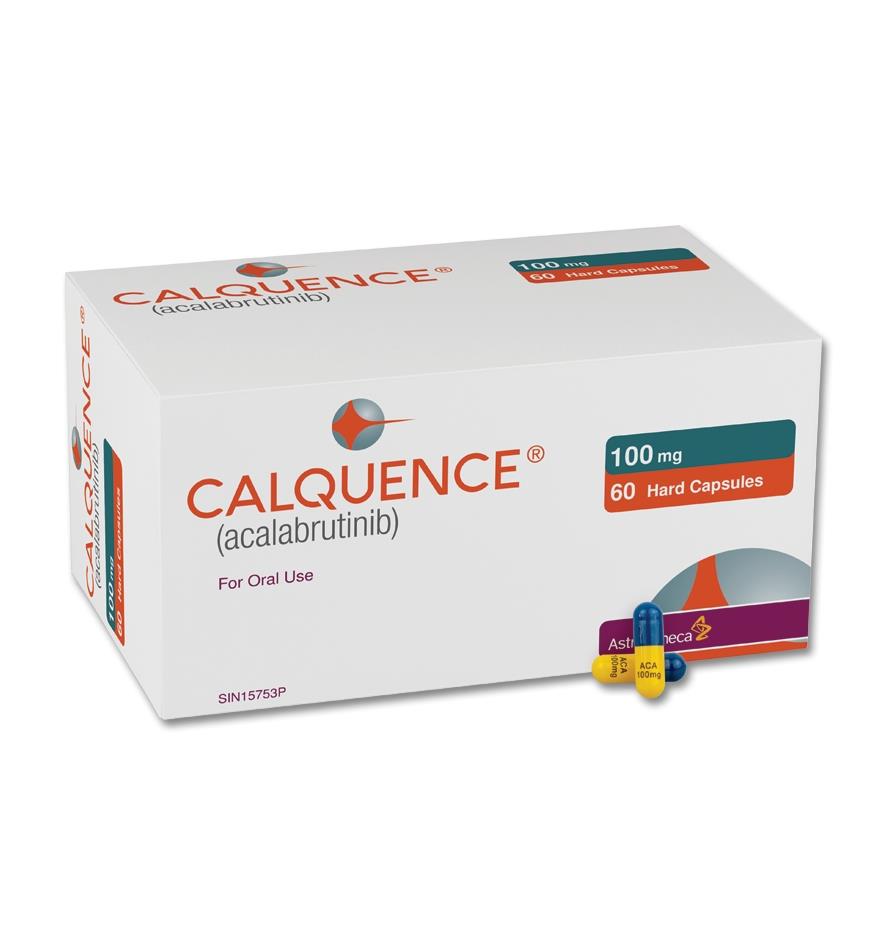Calquence (acalabrutinib) vs Columvi (glofitamab-gxbm)
Calquence (acalabrutinib) vs Columvi (glofitamab-gxbm)
Calquence (acalabrutinib) is a Bruton's tyrosine kinase (BTK) inhibitor used primarily in the treatment of certain types of B-cell malignancies, such as chronic lymphocytic leukemia (CLL) and mantle cell lymphoma (MCL). On the other hand, Glofitamab (under the investigational name and not yet approved with the trade name Columvi as of the knowledge cutoff in 2023) is a bispecific CD20xCD3 T-cell engager designed for the treatment of relapsed or refractory B-cell non-Hodgkin lymphomas. When deciding between these medications, a patient should consider the specific type of lymphoma they have, the stage of the disease, previous treatments, potential side effects, and the advice of their healthcare provider, as each medication targets different mechanisms of action and is indicated for different patient populations.
Difference between Calquence and Columvi
| Metric | Calquence (acalabrutinib) | Columvi (glofitamab-gxbm) |
|---|---|---|
| Generic name | Acalabrutinib | Glofitamab-gxbm |
| Indications | Chronic lymphocytic leukemia (CLL), Small lymphocytic lymphoma (SLL), Mantle cell lymphoma (MCL) | Currently under investigation, potential use in B-cell non-Hodgkin lymphoma |
| Mechanism of action | Bruton's tyrosine kinase (BTK) inhibitor | Bispecific monoclonal antibody targeting CD20 on B-cells and CD3 on T-cells |
| Brand names | Calquence | Columvi (not yet commercially available) |
| Administrative route | Oral | Intravenous |
| Side effects | Headache, diarrhea, muscle pain, bruising, fatigue, anemia | Not fully characterized, may include cytokine release syndrome, infusion-related reactions |
| Contraindications | Hypersensitivity to acalabrutinib or its excipients, severe hepatic impairment | Not fully established, likely hypersensitivity to glofitamab or its excipients |
| Drug class | Small molecule kinase inhibitor | Monoclonal antibody |
| Manufacturer | AstraZeneca | Roche |
Efficacy
Calquence (Acalabrutinib) Efficacy in Lymphoma
Calquence (acalabrutinib) is a Bruton's tyrosine kinase (BTK) inhibitor that has shown efficacy in treating certain types of lymphoma, particularly mantle cell lymphoma (MCL) and chronic lymphocytic leukemia (CLL)/small lymphocytic lymphoma (SLL). In clinical trials, acalabrutinib has demonstrated a high overall response rate in patients with relapsed or refractory MCL. The drug has been approved by regulatory agencies for these indications due to its ability to block BTK signaling, which is essential for the growth and survival of malignant B cells.
In clinical settings, acalabrutinib has been favored for its efficacy and a tolerable safety profile. Studies have shown that the progression-free survival (PFS) rates are significantly improved in patients treated with acalabrutinib compared to alternative treatments. The drug's efficacy in CLL/SLL has also been notable, with a substantial proportion of patients achieving partial or complete remission. The effectiveness of acalabrutinib in these lymphoma subtypes has led to its consideration as a frontline treatment option.
Columvi (Glofitamab-gxbm) Efficacy in Lymphoma
Columvi (glofitamab-gxbm) is an investigational bispecific monoclonal antibody designed to target CD20 on B cells and CD3 on T cells, thereby engaging the patient's own immune system to attack B-cell lymphomas. While not yet approved, glofitamab is being studied in clinical trials for its potential to treat various B-cell lymphomas, including non-Hodgkin's lymphoma (NHL). Early clinical trial results have shown promising efficacy in heavily pretreated patients with relapsed or refractory NHL, including those who have not responded to or have relapsed after CAR T-cell therapies.
Initial data from these trials suggest that glofitamab can induce complete responses in a significant number of patients, with some experiencing durable remissions. The dual targeting mechanism of glofitamab is thought to enhance its ability to eliminate lymphoma cells compared to traditional monoclonal antibodies. Ongoing studies continue to evaluate the long-term efficacy and safety of glofitamab in a broader lymphoma population, with the hope of providing a new therapeutic option for patients with limited treatment choices.
Regulatory Agency Approvals
Calquence
-
European Medical Agency (EMA), European Union

-
Food and Drug Administration (FDA), USA

-
Health Canada

-
Pharmaceuticals and Medical Devices Agency (PMDA), Japan

-
Therapeutic Goods Administration (TGA), Australia

Columvi
-
European Medical Agency (EMA), European Union

-
Food and Drug Administration (FDA), USA

Access Calquence or Columvi today
If Calquence or Columvi are not approved or available in your country (e.g. due to supply issues), you can access them via Everyone.org.
How it works

Make an enquiry
Choose the medicine you want to buy, answer a couple of questions, and upload your prescription to speed things up. We’ll get back to you within 24 hours.


Make an enquiry
Choose the medicine you want to buy, answer a couple of questions, and upload your prescription to speed things up. We’ll get back to you within 24 hours.


Breeze through the paperwork
We'll guide you through the required documents for importing unapproved medicine, ensuring you have all the necessary information.


Get a personalized quote
We’ll prepare a quote for you, including medicine costs and any shipping, administrative, or import fees that may apply.


Receive your medicine
Accept the quote and we’ll handle the rest - sourcing and safely delivering your medicine.

Some text on this page has been automatically generated. Speak to your physician before you start a new treatment or medication.
Let's talk
If you have any questions, call us or send us a message through WhatsApp or email:
Contact us




